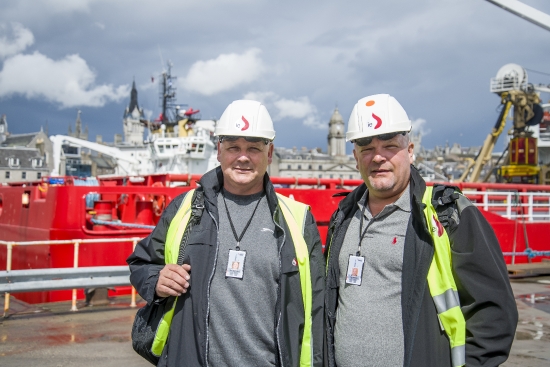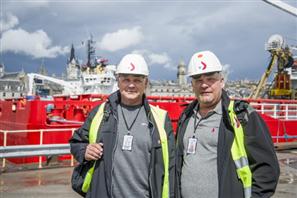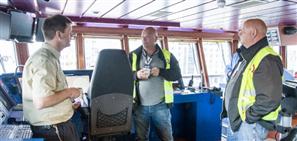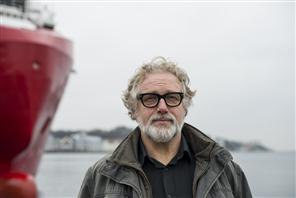The hunt for multi-purpose vessels
19.08.2014 10:10:00
Offshore inspectors Tor Leversen and Kjell Bjarne Eide in Industri Energi make the trip to Scotland at least once a month to inspect multi-purpose vessels. The objective is to uncover social dumping.
For mer informasjon

 Text: Atle Espen Helgesen
Text: Atle Espen HelgesenAberdeen, Scotland
The offshore vessels are lined up in rows along the quays in Aberdeen. Most are supply ships transporting goods and equipment to the platforms, but one of the boats is different, and catches the eye of the offshore inspectors.
The Bahamas-registered “Skandi Carla” has huge cranes, a helideck and an unmanned remotely operated vehicle (ROV) in plain sight. The ship is owned by Norwegian DOF Management, but is operated by Fugro Subsea Services.
"That is definitely a multi-purpose vessel," confirm offshore inspectors Tor Leversen and Kjell Bjarne Eide.
They immediately contact the harbourmaster. After a brief chat with the official and a few quick phone calls, we are admitted on board and greeted by the Captain. He is Norwegian, seems a bit surprised, but is cooperative.
The inspectors introduce themselves. They explain their work, ask to speak to some of the technical crew, and to inspect the crew list. The tone is friendly and all of the inspectors' requests are fulfilled.
We are told that “Skandi Carla” is in Aberdeen for a crew change, and that they will be heading for the Norwegian continental shelf in a couple of days on assignment for US oil company Marathon on the Alvheim oilfield.
Nervous crew
We are guided through narrow corridors and steep stairs down to the mess room where we meet a few of the technical crew on board – one woman and two men. They are British and work on the ROV and subsea operations for Fugro.
Eide and Leversen explain that they are inspecting multi-purpose vessels, checking employment conditions and employment contracts among the technical personnel, with the objective of exposing social dumping. The tone immediately changes. The Brits look at each other, their expressions are grave and they are obviously nervous.
"We have to get permission from headquarters to talk to you," says the woman, who leaves to make a phone call. She returns in a few minutes. "We're not allowed to talk to you. Sorry," she says. The three Brits leave the mess room.
 Successful inspection
Successful inspection Offshore inspectors Leversen and Eide say that the inspection was still a success.
"We obtained a lot of interesting information. Among other things, we were able to confirm that multi-purpose vessels that operate on the Norwegian shelf call at ports in the United Kingdom. We also saw confirmation of the hostility towards unions that is prevalent among many foreign companies, particularly British companies, where the employees are not allowed to speak to us. This also illustrates that the Norwegian labour movement has a strong position outside Norway's borders," says Tor Leversen.
"I'm really not surprised. We've noticed in recent months that it is becoming harder to really talk to the people on board the ships. I think the fact that we carry out inspections in Scotland has been noticed, and people have been told not to talk to us," says Kjell Bjarne Eide.
He tells us that the Industri Energi will now contact union representatives in the Norwegian part of Fugro and ask them to check whether any of the people on board “Skandi Carla” can work under a Norwegian wage agreement.
"Since the boat will be working on the Norwegian shelf, the technical personnel on board could actually become members of Industri Energi, but here they never even had an opportunity to talk to us. That's scary," says Tor Leversen.
Kjell Bjarne Eide confirms that the prevailing practice on multi-purpose vessels registered outside the Nordic countries is so-called "Singapore contracts" and social dumping – without exception.
"We know that there is extensive social dumping on these ships, but it is a difficult, time-consuming job to uncover the practice and secure documentation," says Eide.
Both fear that it will become more difficult to conduct inspections in British harbours in the time ahead, but they appreciate the good cooperation with the International Transport Workers' Federation (ITF) and the British National Union of Rail, Transport and Maritime Workers (RMT).
"Without them, it would not be possible to conduct these inspections over here," they say.
Lawless area
The background for the ship inspections is the fact that an increasing share of the Norwegian petroleum activities are conducted using multi-purpose vessels, but there are no adequate employment regulations in place for this activity.

"Multi-purpose ships have become a problem in the petroleum industry due to the lack of employment regulations, supervision and, in large part, employees without rights," says section head of Industri Energi's inspectorate section, Per Inge Grimsmo.
He explains that an ROV operator might live in Bergen, be employed in a company registered in Singapore, and hired out via a Scottish employment agency to work on the Norwegian shelf. Without fixed pay and subject to the risk of being fired on the spot.
"The people on board work on foreign employment contracts, for example in Singapore, which provides poor safeguards and personal protection. And the wage levels are set accordingly," says Grimsmo.
He says that the way the companies organise themselves allows them to avoid collective wage agreements. And that the national authorities and supervisory authorities know little about the working environment and safety on board the foreign-registered multi-purpose vessels that work on the Norwegian continental shelf.
The multi-purpose vessels often operate globally, and when they work on the Norwegian continental shelf, it is often just for a limited period.
"The boats don't always call at Norwegian harbours, so the inspectors have to travel around and check ships in Norway, the UK and Denmark. The main aim of the inspections is to uncover the actual conditions on board. We also want to get members on the ships so we can demand collective agreements that apply when the boat is on the Norwegian shelf. However, the international contracts these people work under tend to make them sceptical," says Grimsmo.
New regulations
Industri Energi has started a comprehensive legal effort to change the regulations so that multi-purpose vessels operating on the Norwegian continental shelf are governed by Norwegian law, in the same way as for rigs and platforms.
"We need to make sure that the problem of offshore work from multi-purpose vessels generally not being governed by the Working Environment Act is put on the agenda. This needs to be resolved and we must make sure that Norwegian statutes and regulations also apply to this part of the petroleum industry," says attorney Alexander Lindboe in Industri Energi.
Industri Energi's demands include appointing a multi-partite group under the Ministry of Labour to ensure that multi-purpose vessels on the Norwegian shelf are subject to the Working Environment Act and the Petroleum Safety Authority Norway, as is the case for rigs.
Lindboe explains that the flag state's law and international shipping rules apply to these ships. This means that it is Singapore, Bahamas, or for that matter, Liberian law, that applies on board, even when the ship is working on the Norwegian shelf. There are some international shipping rules that apply in addition.

"But this is quite different from the statutes and rules that apply for fixed and floating installations on the Norwegian shelf. Therefore, we demand that all work done on multi-purpose vessels, whether seismic, ROV operations, pipe inspections or light well intervention, must be governed by the Working Environment Act – period, " he says.
"At the same time, we need to clear up which supervisory authority is responsible for these vessels – is it the Petroleum Safety Authority or the Norwegian Maritime Authority?"
Lindboe explains that the employment conditions on board are fragmented, there is no collective wage agreement for construction personnel, and there are no restrictions on hiring in people on these ships. At the same time, there are significant differences in wages and working conditions on multi-purpose ships, compared with floating rigs.
"We believe this is wrong. Therefore we also want regulations to apply for this part of the industry as well," says Lindboe.
Facts: Multi-purpose vessels
Multi-purpose vessels primarily work on assignments related to subsea operations.
Examples of such work include installation, inspection and maintenance of subsea wells, other subsea equipment, pipelines and infrastructure. Unmanned remote operated vessels (ROVs) are used and manned diving operations are carried out from such ships.
The ships are often owned by a shipping company that leases the vessel to a subsea contractor such as Fugro, Technip or Subsea7.
The ships are often owned by a shipping company that leases the vessel to a subsea contractor such as Fugro, Technip or Subsea7.
Multi-purpose vessels are generally characterised by their powerful cranes and unmanned remote operated vessels. Most also have their own helideck.
The ships can move around fairly quickly, and are both more efficient and cheaper to operate than rigs.
The ships can move around fairly quickly, and are both more efficient and cheaper to operate than rigs.